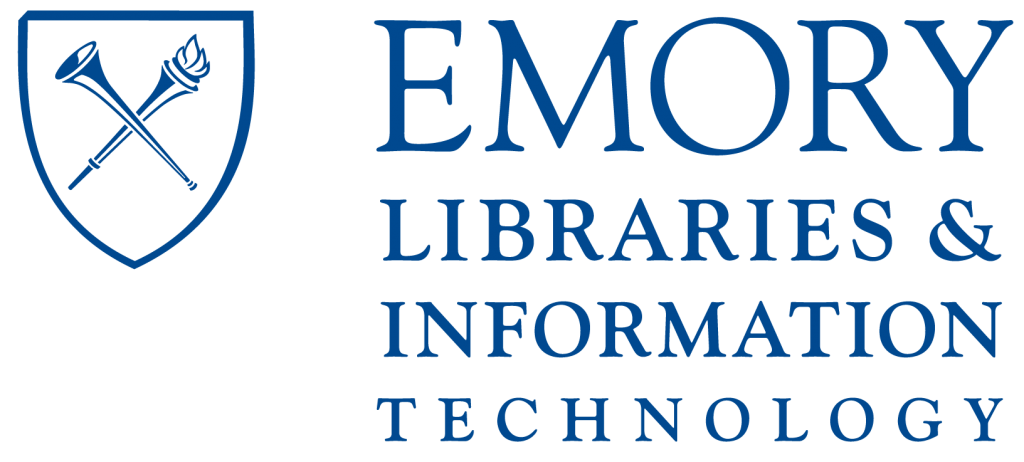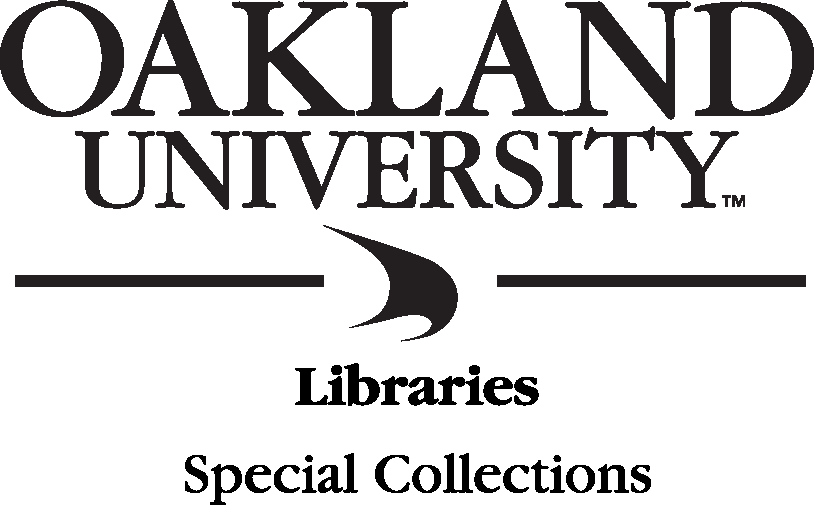from Jun. 1, 1865
A Memorial Discourse on the Character of Abraham Lincoln
-
Full Title
A Memorial Discourse on the Character of Abraham Lincoln
-
Description
Address delivered by P. D. Day at Hollis, New Hampshire where he highlights the President's virtues and encourages his congregation to appreciate government more. He also comments on the international response and compares the event to the death of Abner in Samuel 3:32. He also makes reference to two nicknames for Lincoln, "Father Abraham" and "Honest Abe." During the 19th century, it became popular to publish sermons in newspapers and magazines. Both the Union and the Confederacy reported increased religious fervor during the war. "Abraham Lincoln struggled personally with trying to understand the war in religious terms. Many, including Lincoln, came to see the war as a punishment for disunity and religious failures. A powerful theme of the sermons is the providence of God. Many people viewed Lincoln as a martyr, and often he was compared to Moses, Abraham, and George Washington. Lincoln's assassination took place on Good Friday, so most sermons about his death occurred that following Sunday at services." - The Martyred President, Emory University Libraries.
-
Transcription
Transcript available on The Martyred President: Sermons Given on the Occasion of the Assassination of Abraham Lincoln
-
Source
-
Rights
This item is in the public domain. As a service to other researchers, we request that users credit the Emory University Libraries as the source.
-
Tags
-
Cite this Item
P. D. Day. "A Memorial Discourse on the Character of Abraham Lincoln". McFarland & Jenks. Remembering Lincoln. Web. Accessed October 7, 2025. https://rememberinglincoln.fords.org/node/950
from Jun. 1, 1865
A Memorial Discourse on the Character of Abraham Lincoln
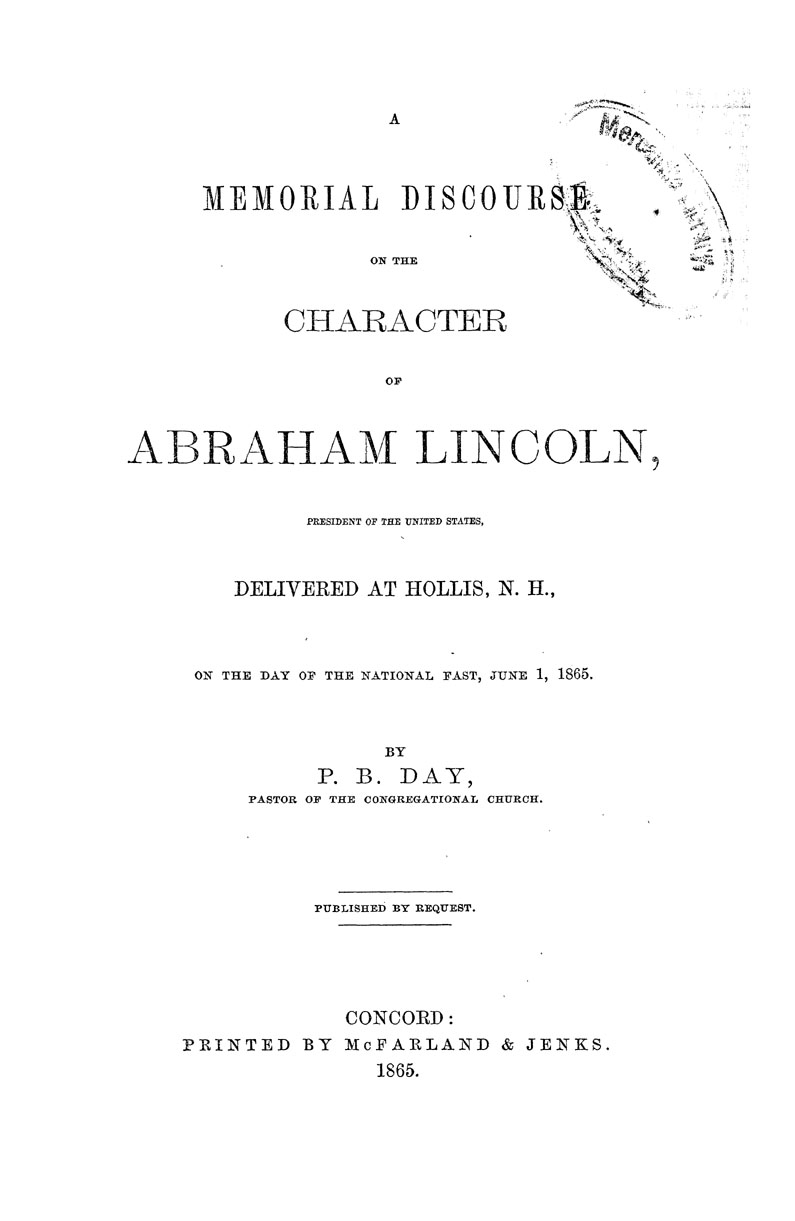
-
Description
Address delivered by P. D. Day at Hollis, New Hampshire where he highlights the President's virtues and encourages his congregation to appreciate government more. He also comments on the international response and compares the event to the death of Abner in Samuel 3:32. He also makes reference to two nicknames for Lincoln, "Father Abraham" and "Honest Abe." During the 19th century, it became popular to publish sermons in newspapers and magazines. Both the Union and the Confederacy reported increased religious fervor during the war. "Abraham Lincoln struggled personally with trying to understand the war in religious terms. Many, including Lincoln, came to see the war as a punishment for disunity and religious failures. A powerful theme of the sermons is the providence of God. Many people viewed Lincoln as a martyr, and often he was compared to Moses, Abraham, and George Washington. Lincoln's assassination took place on Good Friday, so most sermons about his death occurred that following Sunday at services." - The Martyred President, Emory University Libraries.
-
Source
-
Rights
This item is in the public domain. As a service to other researchers, we request that users credit the Emory University Libraries as the source.
-
Creator
P. D. Day
-
Publisher
McFarland & Jenks
-
Date
June 1, 1865
from Nov. 30, 1864
The Martyr President
-
Full Title
The Martyr President
-
Description
Address delivered by J. G. Butler, Pastor of St. Paul's Lutheran Church, Washington, D. C.
-
Transcription
Transcript available on The Martyred President: Sermons Given on the Occasion of the Assassination of Abraham Lincoln
-
Source
-
Rights
This item is in the public domain. As a service to other researchers, we request that users credit the Emory University Libraries as the source.
-
Tags
-
Cite this Item
J. G. Butler. "The Martyr President". McGill & Witherow, Printers and Stereotypers. Remembering Lincoln. Web. Accessed October 7, 2025. https://rememberinglincoln.fords.org/node/947
from Nov. 30, 1864
The Martyr President
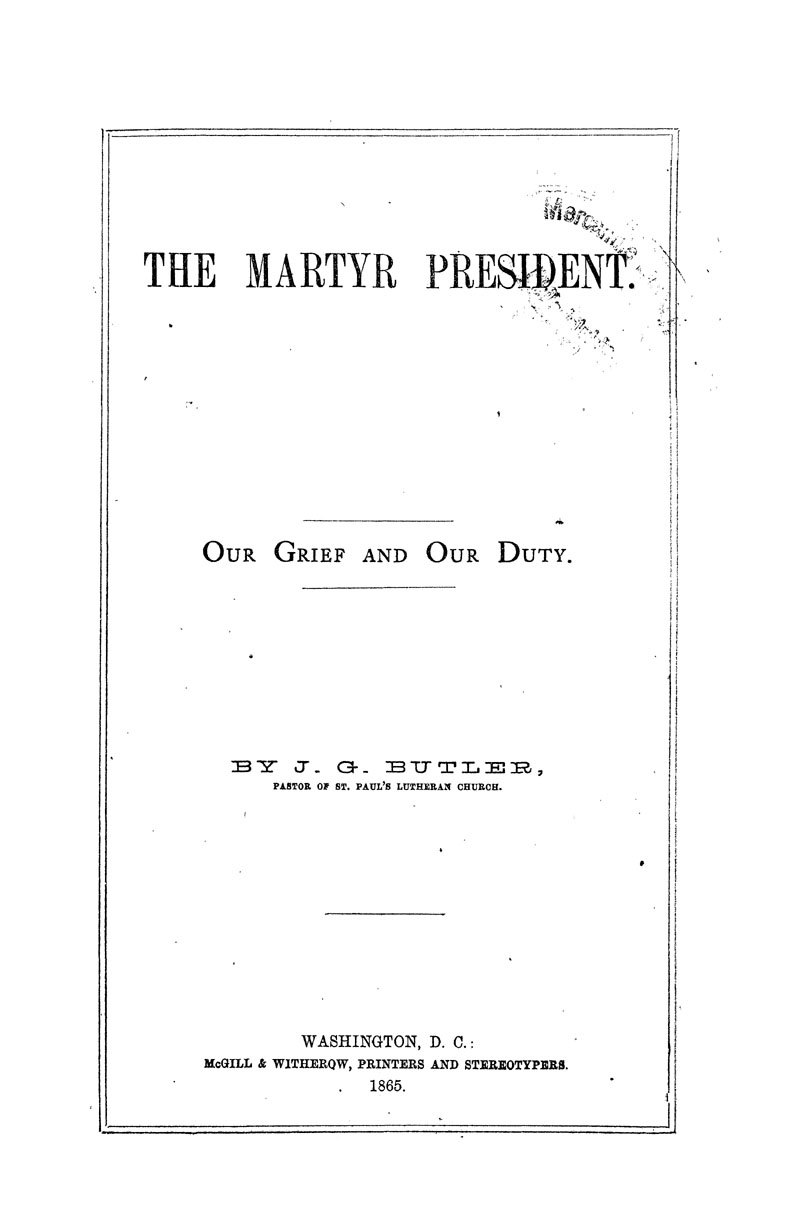
-
Description
Address delivered by J. G. Butler, Pastor of St. Paul's Lutheran Church, Washington, D. C.
-
Source
-
Rights
This item is in the public domain. As a service to other researchers, we request that users credit the Emory University Libraries as the source.
-
Creator
J. G. Butler
-
Publisher
McGill & Witherow, Printers and Stereotypers
-
Date
November 30, 1864
from Jun. 1, 1865
Abraham Lincoln: The Just Magistrate, the Representative Statesman, the Practical Philanthropist
-
Full Title
Abraham Lincoln: The Just Magistrate, the Representative Statesman, the Practical Philanthropist
-
Description
Address by Alex. H. Bullock before the City Council and Citizens of Worcester, Massachusetts.
-
Transcription
Transcript available on The Martyred President: Sermons Given on the Occasion of the Assassination of Abraham Lincoln
-
Source
-
Rights
This item is in the public domain. As a service to other researchers, we request that users credit the Emory University Libraries as the source.
-
Tags
-
Cite this Item
Alex. H. Bullock. "Abraham Lincoln: The Just Magistrate, the Representative Statesman, the Practical Philanthropist". Charles Hamilton. Remembering Lincoln. Web. Accessed October 7, 2025. https://rememberinglincoln.fords.org/node/946
from Jun. 1, 1865
Abraham Lincoln: The Just Magistrate, the Representative Statesman, the Practical Philanthropist
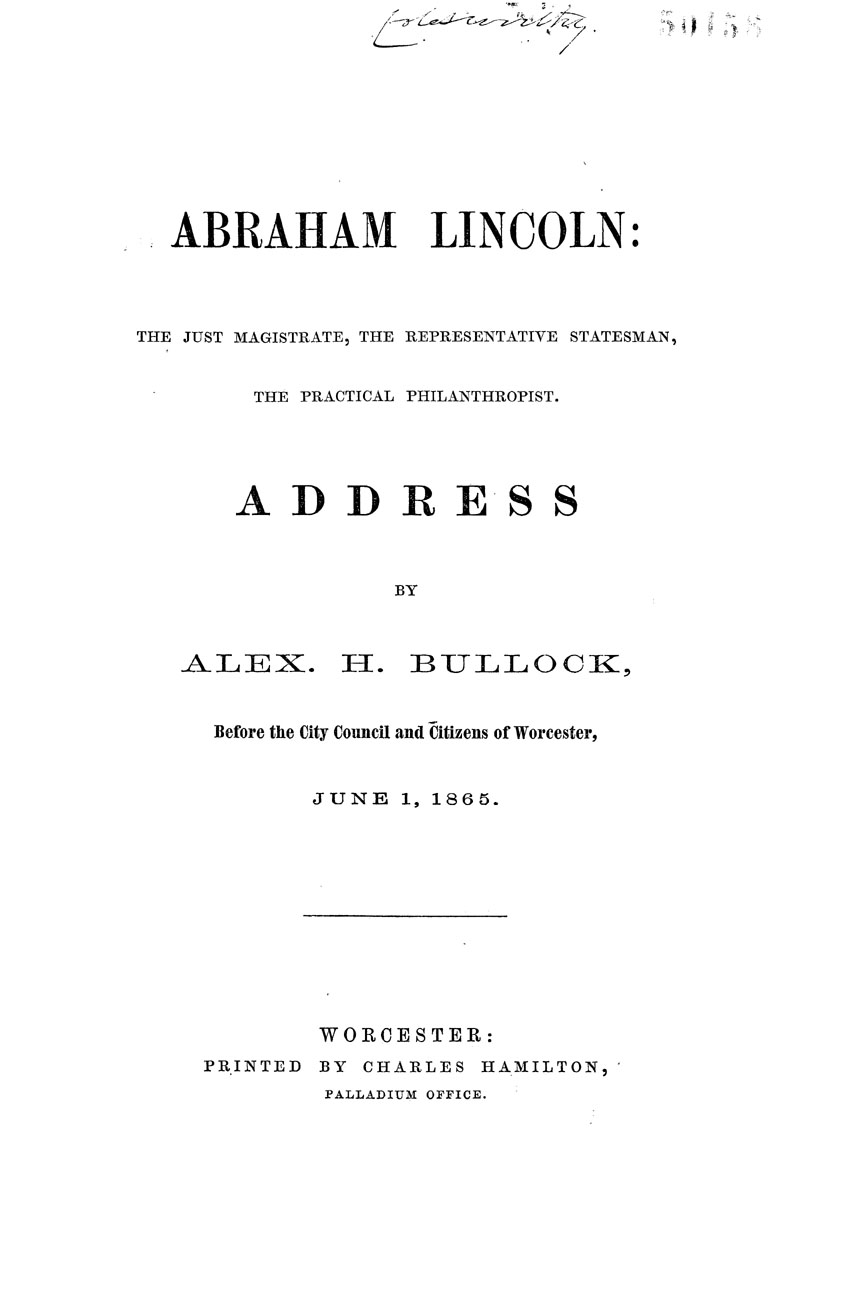
-
Description
Address by Alex. H. Bullock before the City Council and Citizens of Worcester, Massachusetts.
-
Source
-
Rights
This item is in the public domain. As a service to other researchers, we request that users credit the Emory University Libraries as the source.
-
Creator
Alex. H. Bullock
-
Publisher
Charles Hamilton
-
Date
June 1, 1865
from Apr. 17, 1865
Lesson of the hour
-
Full Title
The Lesson of the hour. Justice as well as mercy.
-
Description
A discourse preached on the sabbath following the assassination of the President, in the Capitol Hill Presbyterian Church, Washington, D.C., by the Pastor, Rev. John Chester. 300 copies of this eulogy were distributed. The author intended it as an appeal to the consciences of all supporters of the Union.
-
Source
Springer Collection, Oakland University Special Collections
-
Rights
This item may be reproduced and used for any purpose, including research, teaching, private study, publication, broadcast, or commercial use, with proper citation and attribution.
-
Tags
-
Cite this Item
John Chester. "The Lesson of the hour. Justice as well as mercy.". Washington Chronicle Print . Remembering Lincoln. Web. Accessed October 7, 2025. https://rememberinglincoln.fords.org/node/815
from Apr. 17, 1865
The Lesson of the hour. Justice as well as mercy.
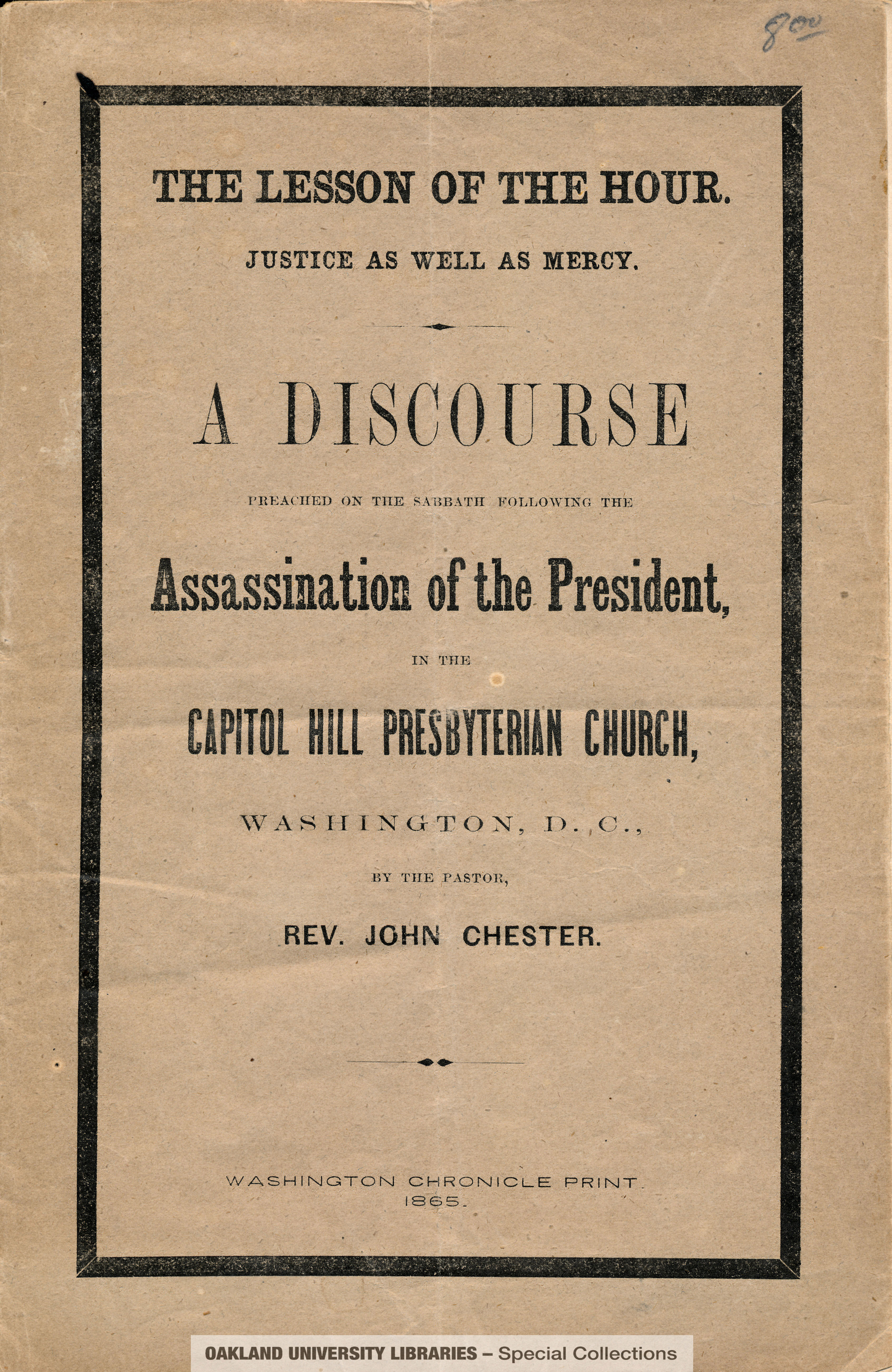
-
Description
A discourse preached on the sabbath following the assassination of the President, in the Capitol Hill Presbyterian Church, Washington, D.C., by the Pastor, Rev. John Chester. 300 copies of this eulogy were distributed. The author intended it as an appeal to the consciences of all supporters of the Union.
-
Source
Springer Collection, Oakland University Special Collections
-
Rights
This item may be reproduced and used for any purpose, including research, teaching, private study, publication, broadcast, or commercial use, with proper citation and attribution.
-
Creator
John Chester
-
Publisher
Washington Chronicle Print
-
Date
April 17, 1865
-
Material
paper
-
Dimensions
8 3/4"h x 5 5/8"w
from Apr. 16, 1865
The Martyr President
-
Full Title
The Martyr President: Our Grief and Our Duty
-
Description
Memorial oratory delivered by J.G. Butler, Pastor of St. Paul's Church on Easter Sunday Apr. 16, 1865.
-
Source
Springer Collection, Oakland University Special Collections
-
Rights
This item may be reproduced and used for any purpose, including research, teaching, private study, publication, broadcast, or commercial use, with proper citation and attribution.
-
Tags
-
Cite this Item
J.G. Butler. "The Martyr President: Our Grief and Our Duty". McGill&Witherow. Remembering Lincoln. Web. Accessed October 7, 2025. https://rememberinglincoln.fords.org/node/814
from Apr. 16, 1865
The Martyr President: Our Grief and Our Duty
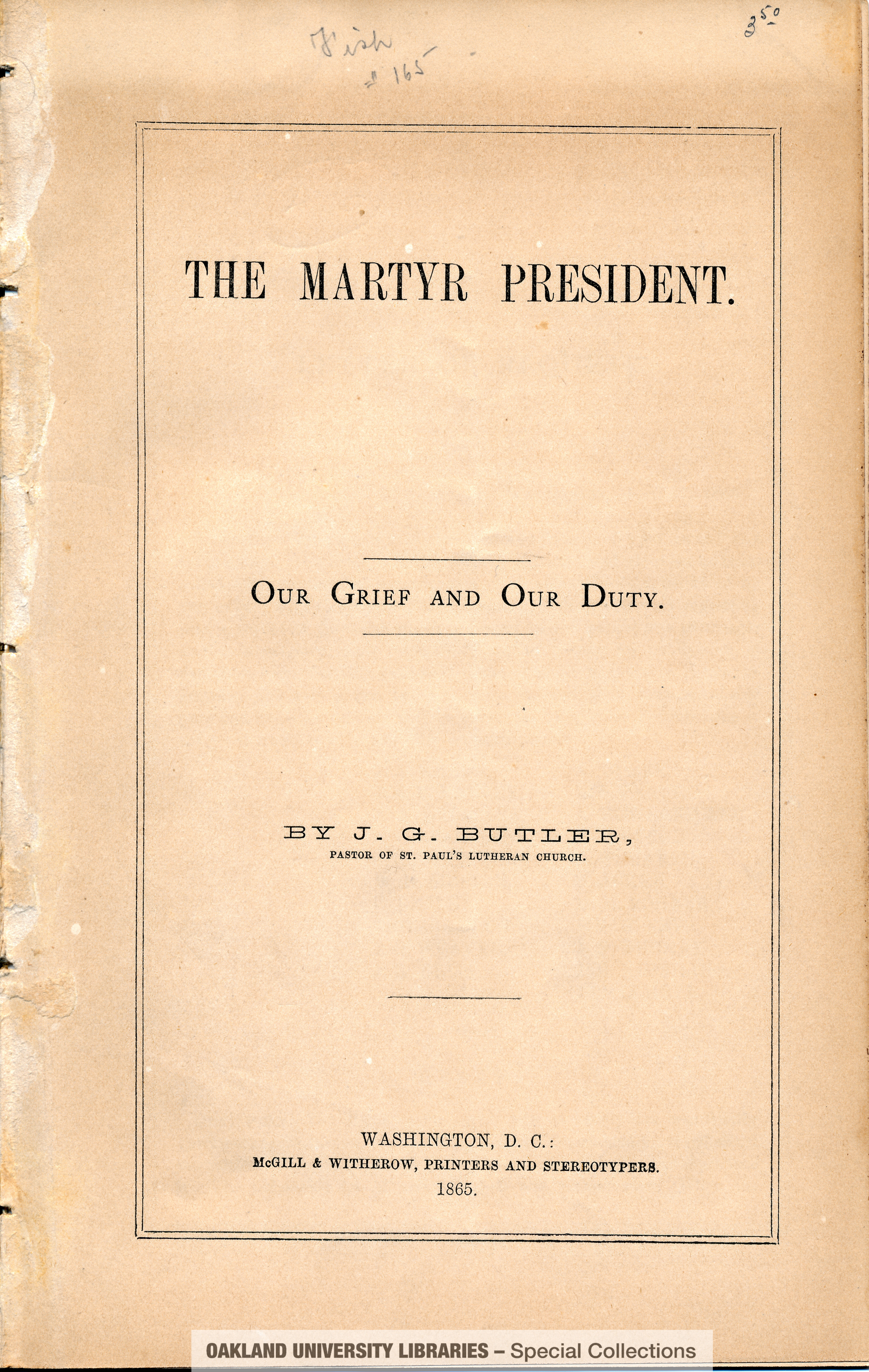
-
Description
Memorial oratory delivered by J.G. Butler, Pastor of St. Paul's Church on Easter Sunday Apr. 16, 1865.
-
Source
Springer Collection, Oakland University Special Collections
-
Rights
This item may be reproduced and used for any purpose, including research, teaching, private study, publication, broadcast, or commercial use, with proper citation and attribution.
-
Creator
J.G. Butler
-
Publisher
McGill&Witherow
-
Date
April 16, 1865
-
Material
paper
-
Dimensions
8 1/2"h x 5 1/2"w
from Feb. 12, 1866
In Memoriam of Abraham Lincoln
-
Full Title
In Memoriam of Abraham Lincoln, the Martyr President of the United States
-
Description
Eulogy delivered by the famous historian and statesman George Bancroft at the request of Congress in front of the House of Representatives on February 12, 1866. Originally published by the Government Printing Office, it was reprinted numerous times.
-
Source
Springer Collection, Oakland University Special Collections
-
Rights
This item may be reproduced and used for any purpose, including research, teaching, private study, publication, broadcast, or commercial use, with proper citation and attribution.
-
Tags
-
Cite this Item
George Bancroft. "In Memoriam of Abraham Lincoln, the Martyr President of the United States". L. Towers. Remembering Lincoln. Web. Accessed October 7, 2025. https://rememberinglincoln.fords.org/node/813
from Feb. 12, 1866
In Memoriam of Abraham Lincoln, the Martyr President of the United States
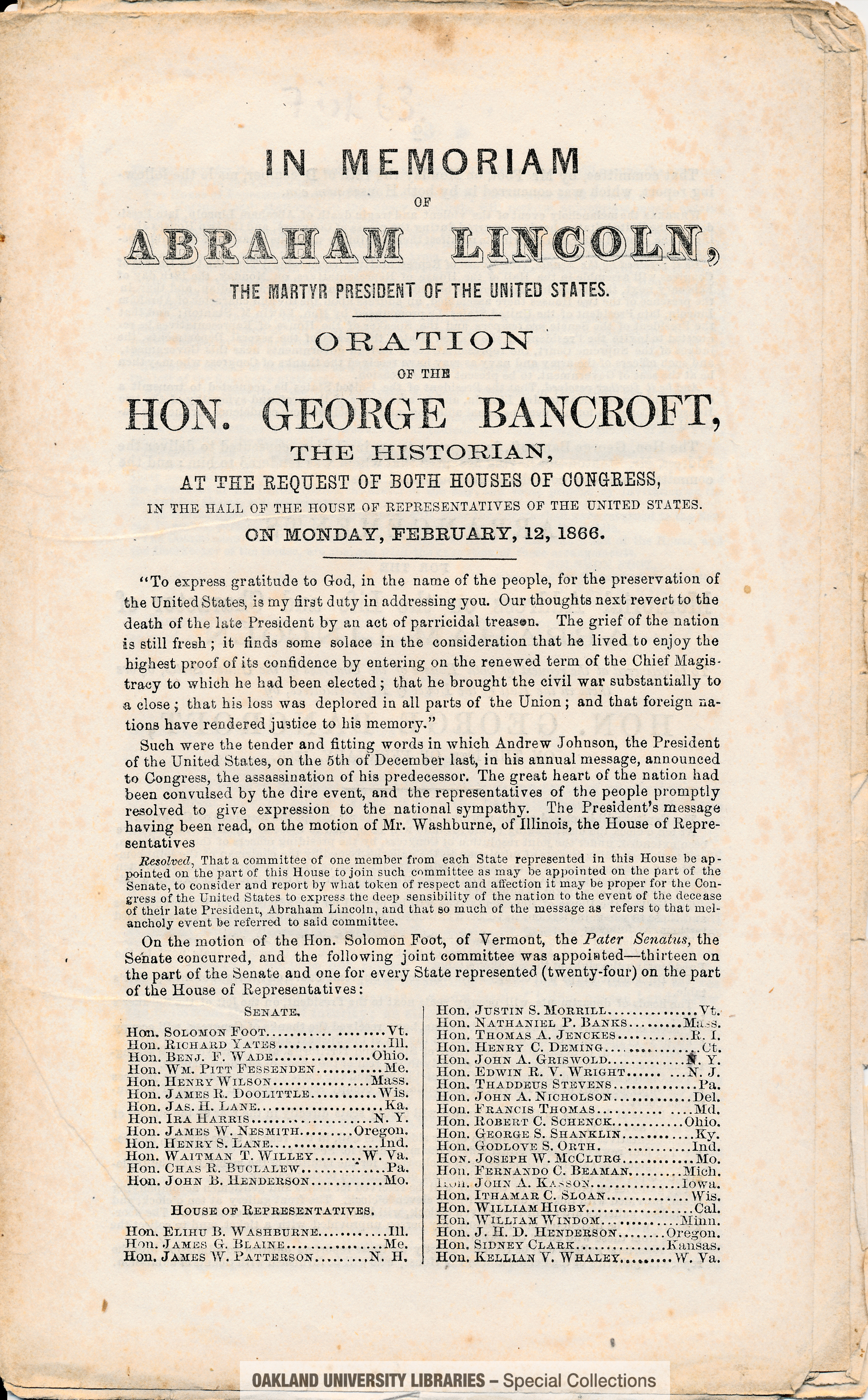
-
Description
Eulogy delivered by the famous historian and statesman George Bancroft at the request of Congress in front of the House of Representatives on February 12, 1866. Originally published by the Government Printing Office, it was reprinted numerous times.
-
Source
Springer Collection, Oakland University Special Collections
-
Rights
This item may be reproduced and used for any purpose, including research, teaching, private study, publication, broadcast, or commercial use, with proper citation and attribution.
-
Creator
George Bancroft
-
Publisher
L. Towers
-
Date
February 12, 1866
-
Material
paper
-
Dimensions
9 1/2"h x 6"w
from Dec. 15, 1865
Abraham Lincoln, a Speech
-
Full Title
Abraham Lincoln, a Speech
-
Description
In this speech, Frederick Douglass reflected on how the outpouring of joy at the conclusion of the Civil War turned to mourning with Lincoln’s assassination. His death, according to Douglass was not only tragic, but also prevented recently freed slaves and African Americans from gaining the ear of wise and well-intentioned leader. Towards the end of his speech, Douglass pondered how life would have been different had Lincoln not perished in April, lamenting that his death was a great blow against African American rights.
-
Transcription
Colored men, first to the brave Colored Soldiers who had fought under our flag and second to the very intelligent part of the Colored population South. This declaration on his part though it seemed to mean but little meant a great deal. It was like Abraham Lincoln. He never shocked prejudices unnecessarily. Having learned Statesmanship while splitting rails, he always used the thin edge of the wedge first, and the fact that he used this at all meant that he would if need be, use the thick as well as the thin. He saw the absurdity of asking men to fight for a Government which should degrade them, and the meanness of enfranchising enemies and de-franchising friends. He was a progressive man, a humane man, an honorable man, and at heart an antislavery man. He had exhausted the resources of conciliation upon rebels and slaveholders and now looked to the principles of Liberty and justice, for the peace, security, happiness and prosperity of his Country. I assume therefore, had Abraham Lincoln been spared to see this day, the negro of the South would have more than a hope of enfranchisement and no rebels could hold the reins of Government in any one of the late rebellious States. Whosoever else have cause to mourn the loss of Abraham Lincoln, to the Colored people of the Country his death is an unspeakable calamity.
[Transcription by: Evan Laugen, Chandra Manning's class, Georgetown University]. -
Source
Frederick Douglass Papers, Manuscript Division, Library of Congress
-
Rights
This item is in the public domain and may be reproduced and used for any purpose, including research, teaching, private study, publication, broadcast or commercial use, with proper citation and attribution.
-
Tags
-
Cite this Item
Frederick Douglass. "Abraham Lincoln, a Speech". Remembering Lincoln. Web. Accessed October 7, 2025. https://rememberinglincoln.fords.org/node/812
-
Creator
Frederick Douglass
-
Date
Late December 1865
from Dec. 15, 1865
Abraham Lincoln, a Speech
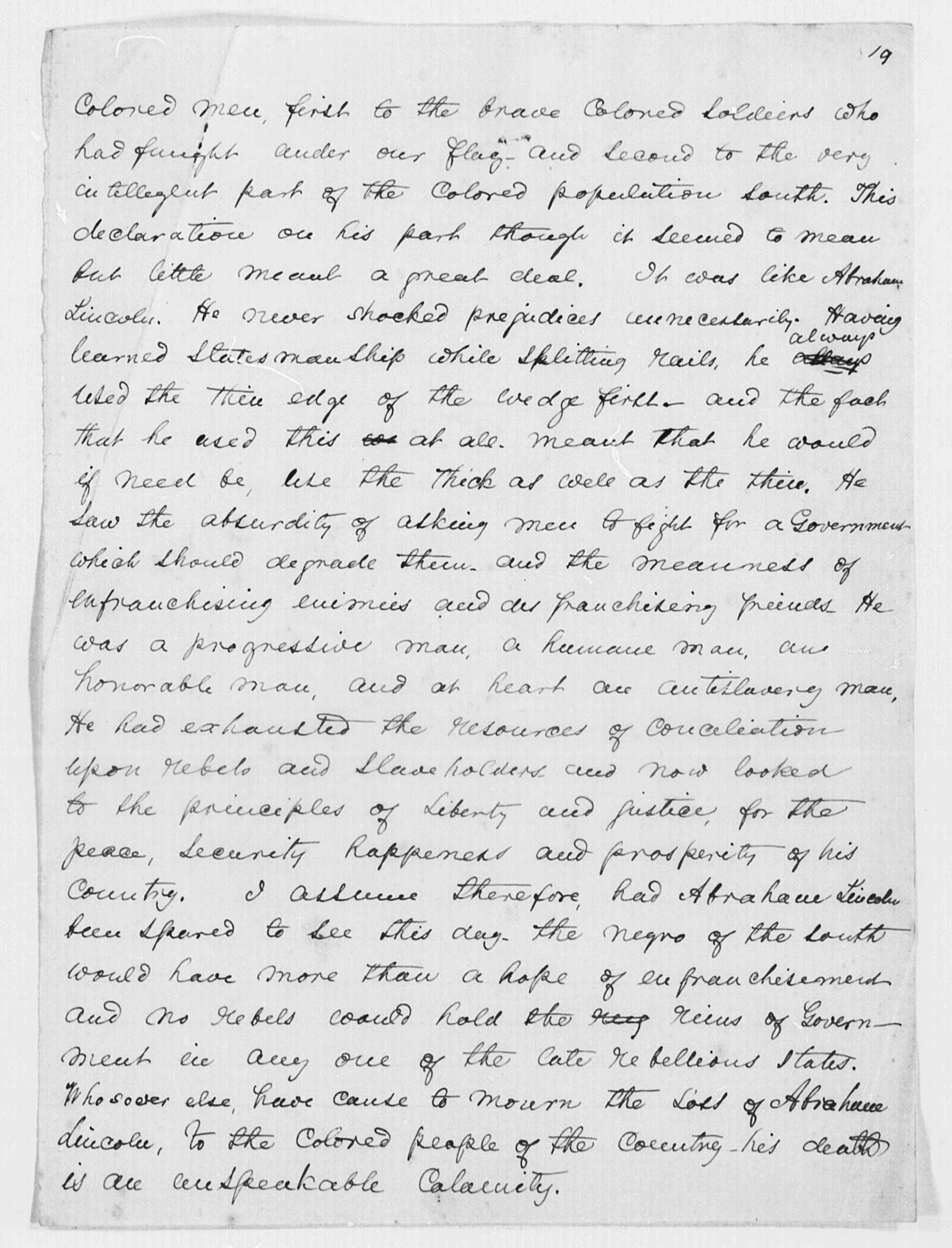
-
Description
In this speech, Frederick Douglass reflected on how the outpouring of joy at the conclusion of the Civil War turned to mourning with Lincoln’s assassination. His death, according to Douglass was not only tragic, but also prevented recently freed slaves and African Americans from gaining the ear of wise and well-intentioned leader. Towards the end of his speech, Douglass pondered how life would have been different had Lincoln not perished in April, lamenting that his death was a great blow against African American rights.
-
Source
Frederick Douglass Papers, Manuscript Division, Library of Congress
-
Rights
This item is in the public domain and may be reproduced and used for any purpose, including research, teaching, private study, publication, broadcast or commercial use, with proper citation and attribution.
-
Creator
Frederick Douglass
-
Date
December 15, 1865
from Apr. 19, 1865
Eulogy by Rabbi David Einhorn
-
Full Title
Eulogy by Rabbi David Einhorn
-
Description
English translation by Alisa Rethy.
-
Transcription
Eulogy by Rabbi David Einhorn
Delivered before Keneseth Israel Congregation, Philadelphia, Pa, on 19 April 1865
And God said to Abram: “Get out of your country, from your family, and from your father’s house, to a land that I will show you. I will make you a great nation; I will bless you; And make your name great; and you shall be a blessing. I will bless those who bless you, and I will curse him who curses you; and in you all the families of the earth shall be blessed. (Genesis 12: 1-4)
The morning cometh, and also the night. (Isaiah 21:12) [1]
God has plunged us from the highest jubilation into the deepest sorrow. Never has a national sorrow been so deep and profound, and paired with such horror, as ours; for a horrible deed has been done, a deed blacker than the starless night and hatched in the deepest pits of hell. Abraham Lincoln, the beloved of his people, the savior of the fatherland, the liberator of millions of enslaved men, God’s anointed one has fallen by the hand of murder, by the hand of a man whose name will be the bane of centuries. Though so many tears have been shed in these four bloody years, they are but a drop in the sea of tears that now flows from the lifeblood of this great nation and surrounds the coffin being carried in Washington with the mortal remains of the best and noblest man. And when did he fall? At the height of his glory and splendor, at the very moment in which his great work was approaching completion with great strides, in which his mild pious heart pondered ways and means to heal the wounds the enemies of the fatherland inflicted upon the land and upon themselves – for he lovingly stretched out his fatherly arms to his murderers! A glittering celebration was already arranged and countless flame-tongues were set to proclaim our jubilation over the cessation of the turmoil of war and the optimistic hope for the restoration of peace – and now the country is clothed in sorrow and there is no jubilation, only broken hearts. The joy of our hearts is destroyed and our bliss turns to lamentation. The crown is fallen from our head [2]. A sweet dawn broke before us, but with morning came the night, the night from which the most dreadful crime was born. How shall I console you when my heart is also broken? No! The time for consolation has not yet come; the wound is still too fresh to heal! Do not hold back your pain, release your grieving in full force for this enormous loss we have suffered! Indeed, our elders teach: one may not attempt to console anyone as long as the body of the loved one still appears before their eyes! But it is surely now the time to demonstrate the foolishness and reprehensibility of any mournful cry that we, in our justified pain, might want to direct against God’s government of the world. Even as our hearts break, our bravery in the fight for a sacred cause, our trust in the infinitely good leader of the history of all nations must remain whole and unshaken. Abraham Lincoln has fallen, but never was he lifted so high as in the moment of his fall. A life like his could not have found any more glorious conclusion. He was the messiah of his people, and far more glorious than the crown of love, with which this people adorned him, gleams the crown of martyrdom, placed by the enemies of the people upon his sunken, bloodied head. His lot has fallen in pleasant places [3]. He was able to seal his immortal work with his blood, which ranks him even higher than Washington and will carry his luminous name through the centuries. And his sublime work – the overcoming of the rebellion and the defeat of slavery – has been in no way unsettled by his demise; rather, it has only been further strengthened. After this ghastly deed, which must open the eyes of even the most blind toward the boundless depravity of the slave drivers and their accomplices, a depravity which would even seek to kill an honorable old man on his sick-bed [4], after this ghastly deed – I say – there can no longer be parties at odds in the North. The murder of the high priest of freedom will and must unify all those who still carry a spark of moral feeling within them, unify them to an intimate brotherhood for the preservation of the republic and the eradication of this shameful institution. Those, too, who formerly misunderstood and vilified the glorified one and his world-historical feat must now learn to love and honor both the man and the deed. There is a profound meaning in the rabbinic saying: The death of the righteous procures atonement for the sins of the age. If Abraham Lincoln had a flaw, it was his excessive charity toward the rebels: he, whom the demagogues and the murderer decried as a tyrant! Moses sinned by striking the stone to give water to his thirsting people, though God had ordered him to speak to the stone. The reverse holds true in the case of Abraham Lincoln. He believed he could bow the stiff neck of the insurgents by speaking to them kindly and treating them gently, though this neck can only be bowed through the well-deserved discipline of blows. Yes, let there be mercy, charity, and all possible support for the misled people of the South! But for the leaders of the rebellion, whose hands are so horribly sullied with blood, who made hundreds of thousands widows and orphans, allowed our prisoners to starve in their cellars and, finally, took our adornment and crown from us – upon them be not revenge, but justice! Thus I call in the name of God, and thus also speak thousands, who have suddenly turned from roaring lions into cooing doves – and that, too, is a blessing that emerges from our pain. With this atrocity, the rebellion and slavery have reached the peak of their criminal lives, but upon that peak they have found their permanent grave. The beast, drunken with blood, has sunk its mangling, voracious fangs into the heart of the one who tamed it, but with this blood has only drunk itself to death, while its noble victim lives on, loved and blessed thousand fold in the memory of his people and in the memory of all of humanity. When Israel went forth from Egypt, it carried as a flaming victory banner before it the coffin which held the bones of Joseph, that righteous one, who through all manner of storms never strayed from God’s path. Joseph, a powerful leader, lovingly embraced those who betrayed him after they declared their remorse and, even in the hour of death, still proclaimed the ultimate redemption of his tribe with unshakeable confidence. As the Midrash aptly states: “the sea, which Israel crossed on dry land, parted before this coffin, before the sacred ashes, the national treasure.” And thus, too, will the sea of impermanence never be able to wash away the memory of Abraham Lincoln! In the most distant times the banner of freedom will still wave high and proud on his burial mound and spark courage in the fight against the enemies of freedom; still, in the farthest future, millions of pilgrims will surge there and say: here rests America’s pride and ornament, he who – like Moses – led his people through a long bleak desert to the border of Canaan, and was not permitted to enter! The fourth of July and the fifteenth of April are henceforth the two greatest days in American history. The first laid the foundation stone for the great construction of the Republic, the latter set the capstone – which is Lincoln’s gravestone. For this reason, honor God and do not doubt that from this horrible night a glorious morning will break forth, that God’s purifying and glorifying love stands beside our lamentation of woe, a love which will adorn the one who blissfully sleeps in the beyond with the most glorious crown.
So go into peace – You, Abraham, father of nations, who have become a rich blessing not only for us, but for the entire family of man upon the wide world! Go to the land of eternal life and receive in the kingdom of glorified spirits the sweet wage of the righteous! Our love to you will never fade, and as long as breath is in us we will never cease blessing you with the threefold blessing of the priest: God bless you and keep you, God make his face shine upon you and be gracious to you, God turn his face to you and grant you peace! [5]
Most glorious judge over life and death, all-powerful leader of the history of all nations! you have laid a hard, painful trial upon us! brighter than the vault of heaven, shining more gloriously than the sun upon our head – there you allowed the lightning bolt to descend thundering and terrible upon the son of the dawn, upon the savior and redeemer of our country! as you once took Aaron’s beloved children from him on his day of joy and honor, so have you allowed the chosen one to be snatched from us in the middle of the highest jubilation, have elected the priest of freedom to be freedom’s victim. But still we kiss your chastising fatherly hand, like Aaron, and bow in deep humility before your unfathomable wisdom, in unshakeable trust that you will also lead our people through this terrible trial to victory and triumph, through this dark night to the bright morning. You have not cast us away, but purified us; you wanted to cleanse this land of the hideous black stain that darkened the light of your freedom, and you have washed this stain away forever with the noble blood of the one beloved by you and us. Oh take him graciously to your fatherly heart, that pious, patient sufferer, who breathed his last in fighting for you and, in your higher sanctuary, let him partake of all the blessedness that you have preserved for your loyal devotees. Pour the soothing balm of consolation in the deep wounds of his mourning family, of his entire people, which calls after him, having ascended to heaven, in unspeakable woe: my father, my father! O God, let his spirit be passed on to his successor, as the spirit of Elijah, gathered in a whirlwind, was passed on to Elisha, so that he might happily consummate his great work and arise, with doubled strength, against the worshippers of Baal – so that the serpent could no longer destroy upon Your holy mountain and that the long-awaited peace would soon be upon us! [6] Once, Abraham wanted to sacrifice his beloved son to you – here the children bring you their sacrificed father Abraham with broken, but humble hearts. But let salvation arise from our tears, and permit the gifts we now donate in memory of the beloved for our heroes of freedom and their bereaved families! Amen.
And now, beloved friends, let us give these gifts! We could no better honor the memory of the one who has gone to sleep than by offering sacrifices upon the altar of the fatherland for our freedom-fighters and their widows and orphans. The mosaic law demands: if the body of a slain one is found, and the murderer has not been apprehended, a sacrifice shall be offered, because the national community feels tainted and in need of atonement. We find ourselves in the same situation, and to dry the tears of those who shed their blood for us – let these be our sacrifices! Thus, each will gladly make a contribution, for we must honor his martyrdom – kiddush hashem [7] – and must honor him, who also protected us as Israelites and embraced us with a loving heart.
[1] Written as Isaiah 21:11 in the original but it appears to be 21:12.
[2] Lamentations 5:16.
[3] Reference to Psalms 16:6.
[4] Possible reference to notorious Confederate guerilla fighter Champ Ferguson.
[5] Numbers 6:24.
[6] “Holy mountain” is a reference to Isaiah 11:8–9.
[7] Sanctification of the Holy name.
-
Source
American Jewish Archives. Translation by Alisa Rethy.
-
Rights
Use of this item for research, teaching and private study is permitted with proper citation and attribution.
-
Tags
-
Cite this Item
David Einhorn. "Eulogy by Rabbi David Einhorn". Remembering Lincoln. Web. Accessed October 7, 2025. https://rememberinglincoln.fords.org/node/766
from Apr. 19, 1865
Eulogy by Rabbi David Einhorn
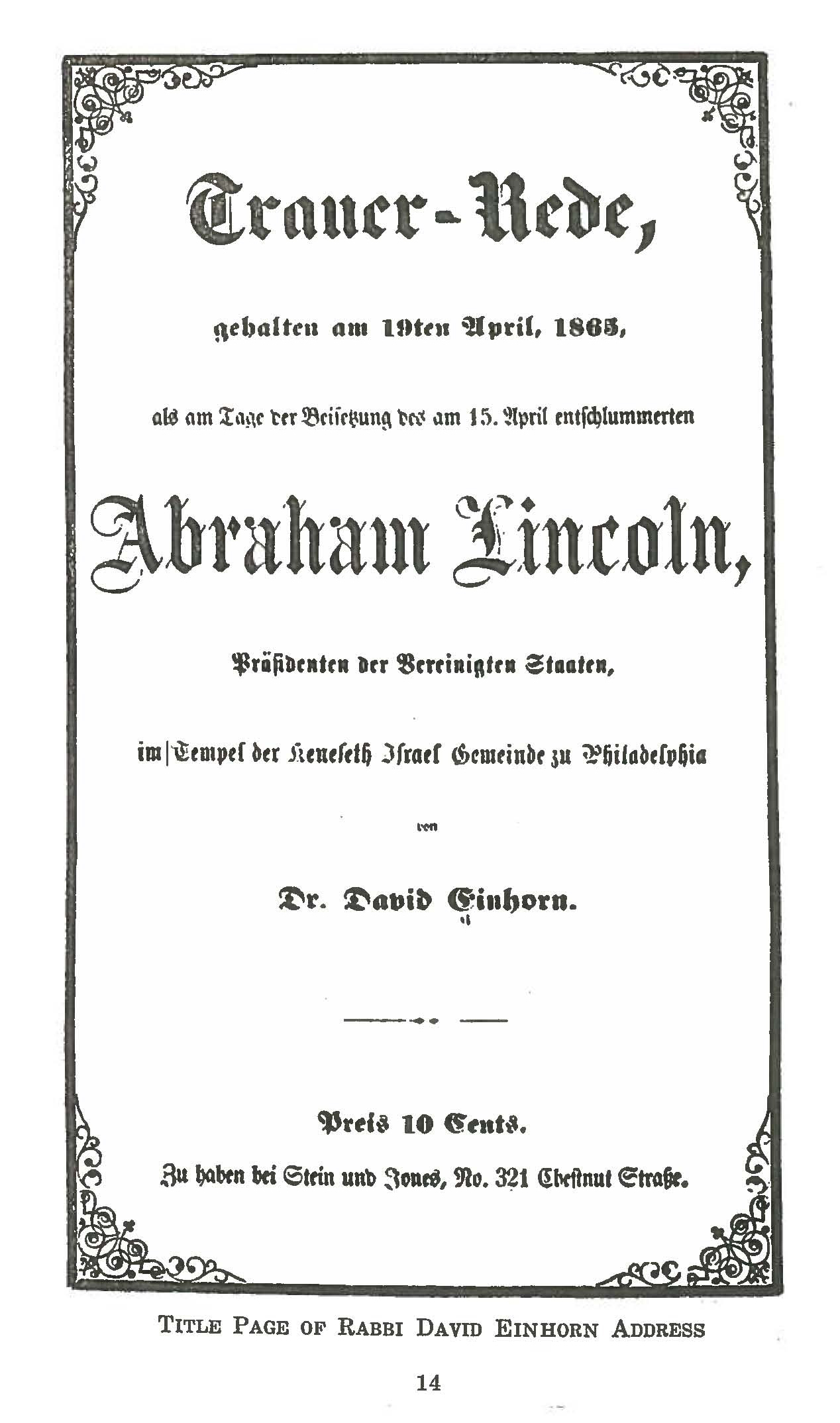
-
Description
English translation by Alisa Rethy.
-
Source
American Jewish Archives. Translation by Alisa Rethy.
-
Rights
Use of this item for research, teaching and private study is permitted with proper citation and attribution.
-
Creator
David Einhorn
-
Date
April 19, 1865
from Apr. 19, 1866
"An Eloquent Speech"
-
Full Title
"An Eloquent Speech"
-
Description
The Beltmont Chronicle reproduced this commemorative speech given in the House of Representatives.
-
Rights
This item is in the public domain and may be reproduced and used for any purpose, including research, teaching, private study, publication, broadcast or commercial use, with proper citation and attribution.
-
Tags
-
Cite this Item
Beltmont Chronicle. ""An Eloquent Speech"". Remembering Lincoln. Web. Accessed October 7, 2025. https://rememberinglincoln.fords.org/node/449
-
Creator
Beltmont Chronicle
-
Date
April 19, 1866
from Apr. 19, 1866
"An Eloquent Speech"

-
Description
The Beltmont Chronicle reproduced this commemorative speech given in the House of Representatives.
-
Rights
This item is in the public domain and may be reproduced and used for any purpose, including research, teaching, private study, publication, broadcast or commercial use, with proper citation and attribution.
-
Creator
Beltmont Chronicle
-
Date
April 19, 1866
from Jul. 12, 1865
Eulogy of Abraham Lincoln
-
Full Title
"Eulogy in the Life and Public Services of Abraham Lincoln" - American Citizen
-
Description
A lengthy eulogy published in the American Citizen in Butler County, PA on July 12, 1865. The article details all the difficulties Lincoln faced as president and the numerous ways he overcame them.
-
Source
Library of Congress Chronicling America
-
Rights
This item is in the public domain and may be reproduced and used for any purpose, including research, teaching, private study, publication, broadcast or commercial use, with proper citation and attribution.
-
Tags
-
Cite this Item
American Citizen. ""Eulogy in the Life and Public Services of Abraham Lincoln" - American Citizen". Remembering Lincoln. Web. Accessed October 7, 2025. https://rememberinglincoln.fords.org/node/446
-
Creator
American Citizen
-
Date
July 12, 1865
from Jul. 12, 1865
"Eulogy in the Life and Public Services of Abraham Lincoln" - American Citizen
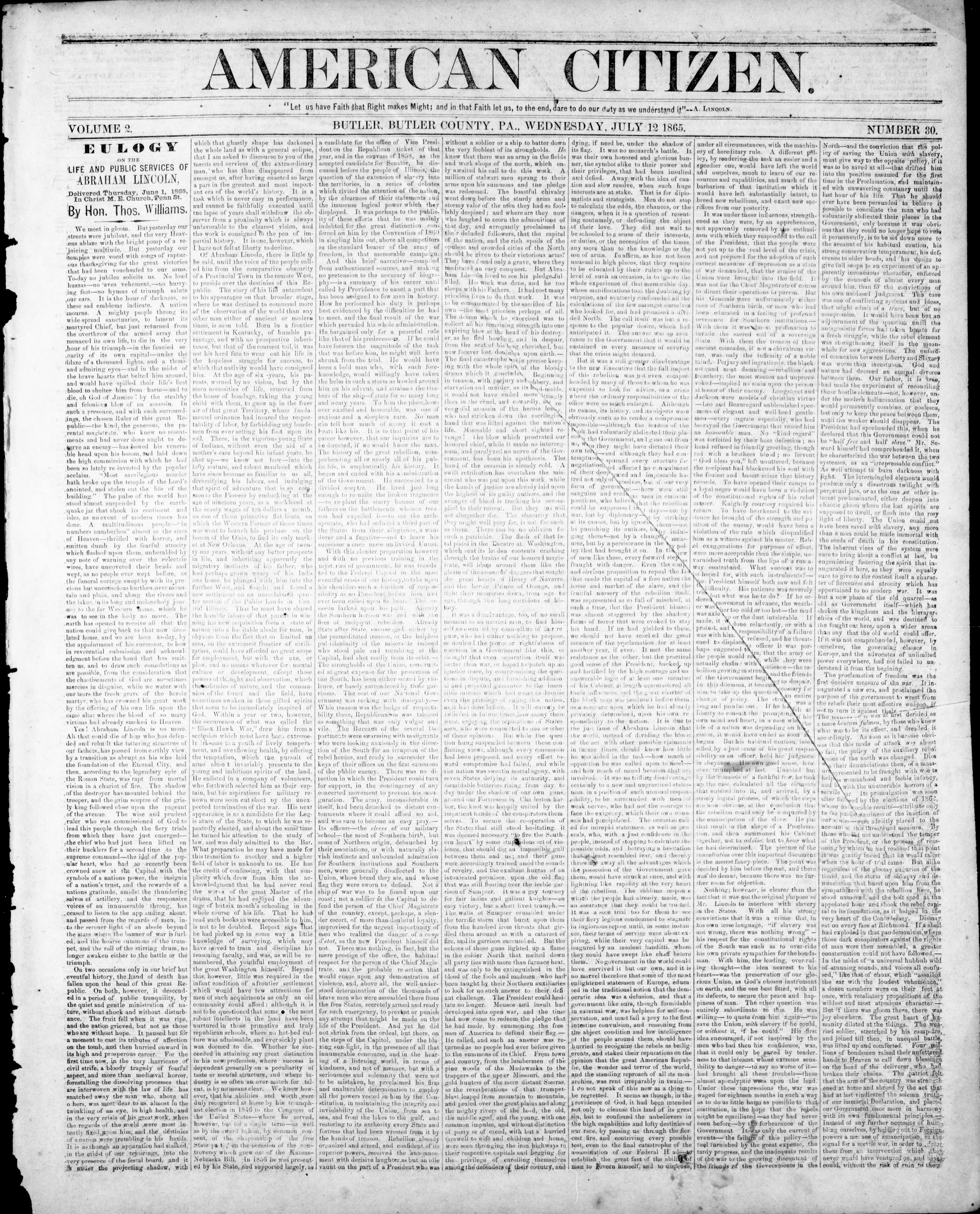
-
Description
A lengthy eulogy published in the American Citizen in Butler County, PA on July 12, 1865. The article details all the difficulties Lincoln faced as president and the numerous ways he overcame them.
-
Source
Library of Congress Chronicling America
-
Rights
This item is in the public domain and may be reproduced and used for any purpose, including research, teaching, private study, publication, broadcast or commercial use, with proper citation and attribution.
-
Creator
American Citizen
-
Date
July 12, 1865
